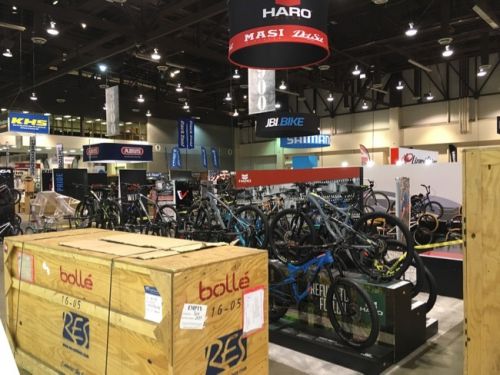RENO, Nev. (BRAIN) — President Donald Trump on Monday said he had approved tariffs on roughly $200 billion of imports from China, including about $1 billion in bicycle products.
In a statement, Trump said the tariffs will take effect on Sept. 24, at 10% until the end of the year, when they will rise to 25 percent. These tariffs are on top of current duties on bike imports.
"Further, if China takes retaliatory action against our farmers or other industries, we will immediately pursue phase three, which is tariffs on approximately $267 billion of additional imports," Trump said.
"As President, it is my duty to protect the interests of working men and women, farmers, ranchers, businesses, and our country itself. My administration will not remain idle when those interests are under attack."
The short time frame before the tariffs take effect means that suppliers will face an unexpected 10% charge on imports that are already in transit but arrive after next Sunday.
The U.S. Trade Representative said safety products, including bicycle helmets and bike lights, were among the 297 product categories removed from the list of proposed tariffs. The USTR said consumer electronics including smartwatches, industrial chemicals, safety products, and child safety furniture like high chairs were exempted.
This is the fourth round of tariffs to affect the U.S. bike industry this year. Tariffs on steel (of 25 percent) and aluminum (10 percent) took effect in March, raising material costs for U.S. manufacturers. In July, 25 percent tariffs on bearings and some GPS units took effect, and in August, Chinese-made e-bikes and e-bike motors were hit with a 25 percent tariff.
Many members of the bike industry, organized by PeopleForBikes and the Bicycle Product Suppliers Association, testified against this round at hearings in Washington late last month. The tariffs hit virtually all bike related items out of China, including complete bikes, frames, components, tires, wheels, inner tubes, auto racks and some other accessories. Additionally, the tariffs affect some non-bike specific items that the industry uses, including hand tools, nuts and bolts, and other machinery.
PeopleForBikes' Alex Loggeman said the group was disappointed by the decision and called the 25 percent tariff "unsustainable."
"We are deeply concerned that this $250 million annual tax increase for the bicycle industry will risk domestic jobs and make bicycles less affordable for Americans," said Loggeman, PeopleForBikes director of state and local policy.
"The Administration's findings under its Section 301 investigation are not aligned with what the bicycle industry has experienced. Our industry has not been impacted by the underlying theft of intellectual property or advanced technology in China that is the basis for this action. We have aggressively fought against these tariff increases and worked tirelessly to educate decision makers on our industry, our supply chain, and the impact these tariffs will have. Tonight’s news is disappointing and seemingly well outside the intent of the investigation," he said.
BPSA's president, Adam Micklin, told BRAIN, "The BPSA and PeopleForBikes are aware of the tariffs news regarding a possible reduction to 10 percent but we have not had a chance to fully review the list.
"We're going through the list now of the products and items affected as we realize this is critical information for our members," Micklin said. Micklin and much of the rest of the U.S. bike industry was in Reno Monday to attend Interbike.
Some domestic manufacturers of bikes and accessories support the latest round of tariffs, especially in light of the March tariffs on steel and aluminum, which benefitted their competitors who imported complete products. For example, Chris Fortune, the president and owner of Saris Cycle Group, wrote a commentary posted on BRAIN Monday in support of the tariffs.
"These increased tariffs will help level the playing field for American manufacturers like Saris. We are not asking for special treatment, but rather for an equal playing field in a nondiscriminatory business environment. We are invigorated by competition and our commitment to American craftsmanship continues to serve us well. However, without these tariffs, we will be facing an unfair disadvantage. Our competitors will have cost advantages that will be incredibly difficult to overcome," Fortune wrote.
Matt Moore, QBP's general counsel and a BPSA board member, said Monday that there was value in learning the news, which has been anticipated since last Friday.
"The certainty of knowing what the new tariff level will be is valuable in itself," Moore said. However, he said, "The timing of putting it into effect next Monday is insufficient time to adjust. It's unfair to businesses," he said.
Moore was among those who testified against the proposal in Washington. He said he specifically asked that helmets be exempted. "That's good news. At least we did something," he said.


